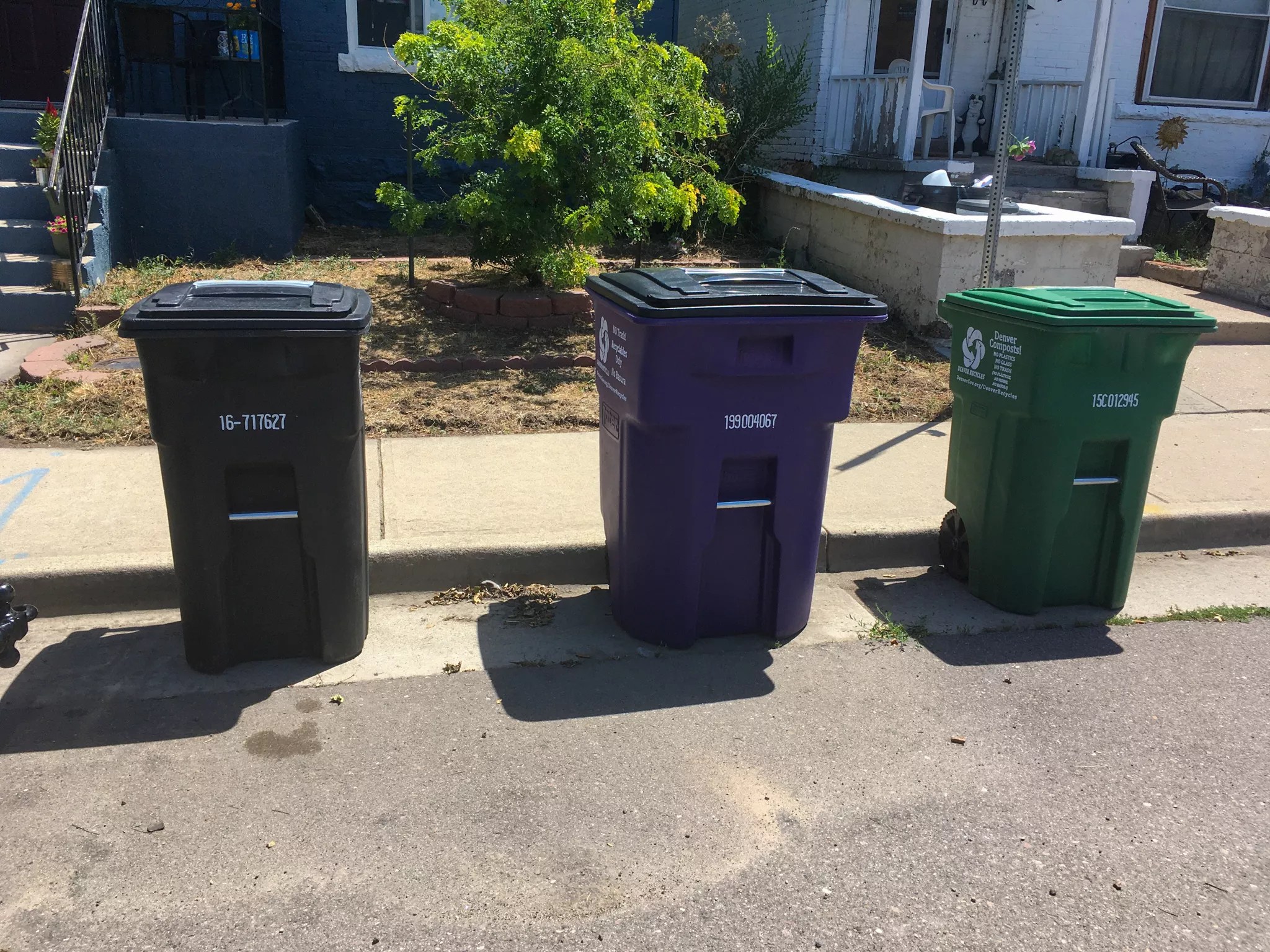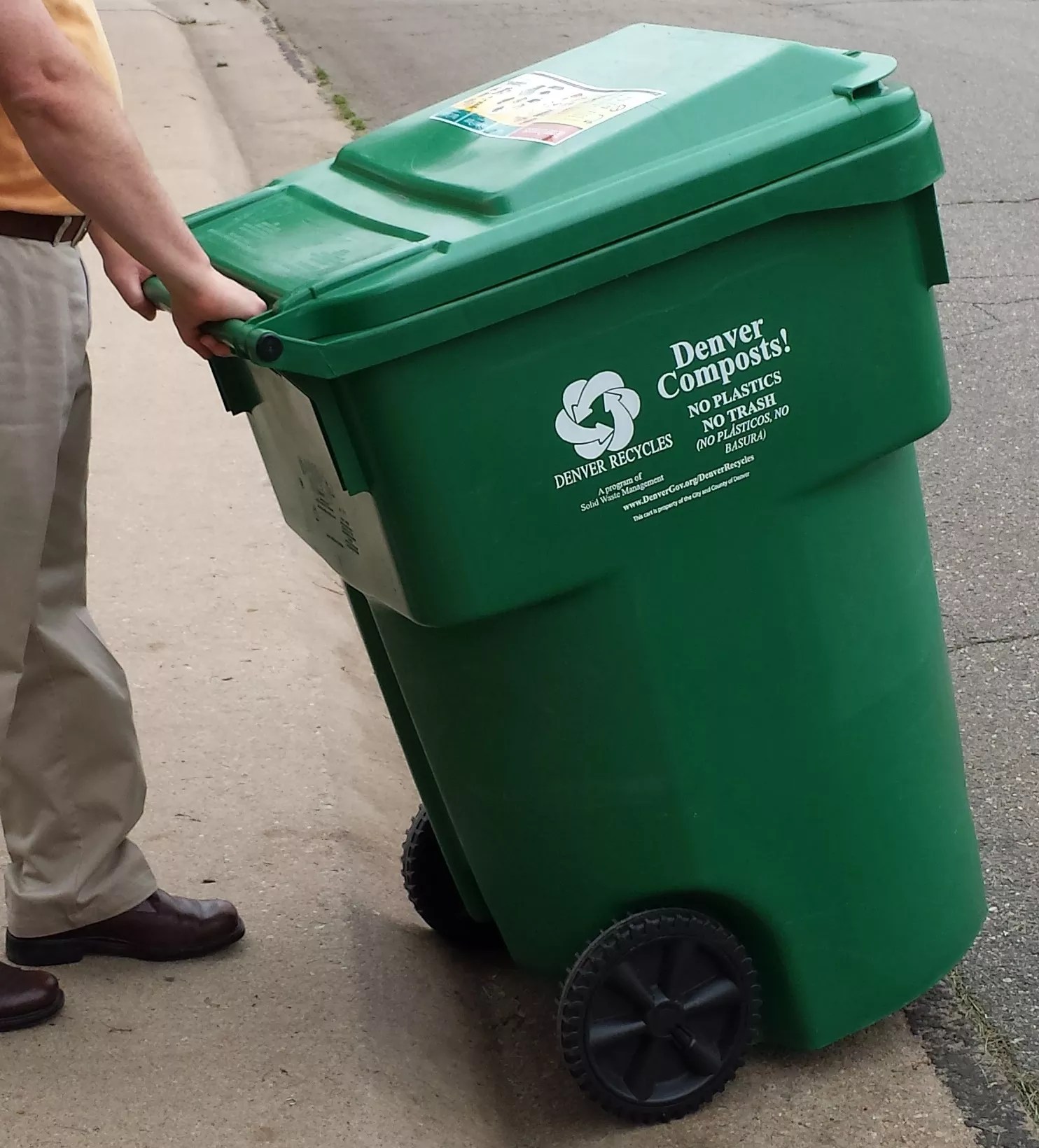
DOTI

Audio By Carbonatix
Since July 31, more than 10,000 Denver households received green compost carts in the first wave of deliveries for the city’s Pay as You Throw trash system approved by Denver City Council in June 2022.
Denver had successfully implemented weekly recycling for all residents served by the Department of Transportation and Infrastructure in January 2023; the compost rollout was the next step toward the goal of diverting waste from landfills to recycling or composting.
The first residents to receive composting carts were in Solid Waste Collection District 2, which includes City Park, City Park West, Clayton, Cole, Elyria-Swansea, Five Points, North Capitol Hill, Skyland, Whittier and parts of Globeville. The city is prioritizing neighborhoods that currently have low diversion rates.
DOTI announced on January 2 that it had completed that rollout and will now expand to Solid Waste Collection District 4, sending letters to 19,100 residents in Montbello, Green Valley Ranch and Gateway about how the new system works. Districts 5, 8 and 3 are next in line, and will receive compost carts later this year.
“New customers will receive a compost cart, a small kitchen pail and an updated compost how-to guide to get them started,” DOTI announced. The kitchen pail is designed so that people can immediately toss scraps there before taking them out to their green cart.
The city estimates that 50 to 75 percent of what people currently put in the trash could be recycled or composted.
“To help residents prepare and understand how to use their carts correctly, the team has been attending community events, doing Spanish and English door-to-door outreach and direct-messaging through our app and in ReCollect,” says Nancy Kuhn, marketing and communications director for DOTI.
To compost or not to compost?
The rules for composting are actually pretty simple: If it’s food or yard scraps or plant trimmings, it belongs in compost. Everything else should either be recycled if possible or trashed if not.
“Paper products including tissues, paper towels, napkins, tissue paper, brightly colored paper, paper scraps and shredded paper, tea bags and coffee liners…pizza boxes,” are all not compostable or recyclable, DOTI notes. However, coffee grounds themselves can be composted if dumped out of the filter.

Green bins are for food and yard scraps only!
DOTI
Even packaging and products such as cups, plates and takeout containers that are certified as compostable don’t belong in Denver-provided compost bins, the city says. Compostable bags don’t either, unless they are three gallons or smaller or Compost Manufacturing Alliance-certified.
“No plastics, glass, metals, diapers, pet waste (even in compostable bags), treated wood, rubber bands, twist ties, produce stickers, sod, mulch, or dirt,” DOTI requests.
To deal with any confusion, DOTI has composting tips and a Waste Directory. If you don’t know which bin to use, just type the kind of waste into the directory and it will tell you exactly what to do. And DOTI isn’t treating residents who contaminate their recycling or compost like trash. It will send an inspector out to homes that have contaminated waste or overfilled trash bins before issuing any citation.
“We’ve not issued any formal citations, but when contamination is found, a tag indicates to the driver that they should not collect the cart and educates the customer about what should and should not be in the cart,” Kuhn says.
The department has been educating and auditing Solid Waste Collection District 2 as composting rolled out there. The expanded waste services ordinance allows fines between $500 and $999 for contamination should DOTI ever reach that point.
Recycling is on the rise in 2024
The expanded waste services ordinance allows people to pick what size trash can they want, paying for that size. Then everyone gets recycling and compost as part of the deal. The options are 35 gallons, which fits two to three tall kitchen bags, for $9 a month; 65 gallons, which fits four to five bags, for $13 a month; and 95 gallons, which fits seven to eight bags, for $21 a month.
As of January 2, 34,665 households had 35-gallon trash carts; 59,364 households had 65-gallon carts and 81,566 households had 95-gallon carts. DOTI recommends people wait to get their compost carts before adjusting their sizing, which can be done on Denver Utilities Online.
Those who are paying for trash service but haven’t received composting yet are getting a $9 quarterly credit on their bills until their neighborhood gets green carts. “Once service begins in that neighborhood, we will remove the credit on future invoices,” Kuhn says.
So far, out of a total of 182,331 households, only 6,736 households have opted out of the program.
This story has been updated from the original published in August 2023.